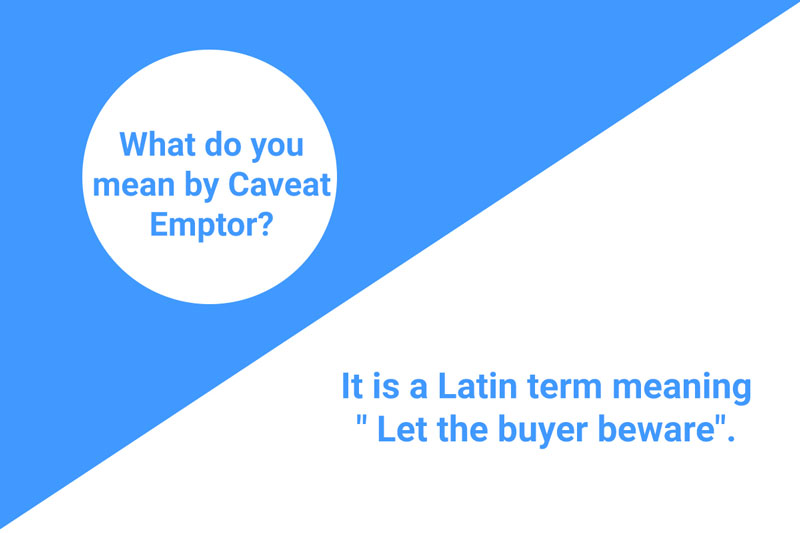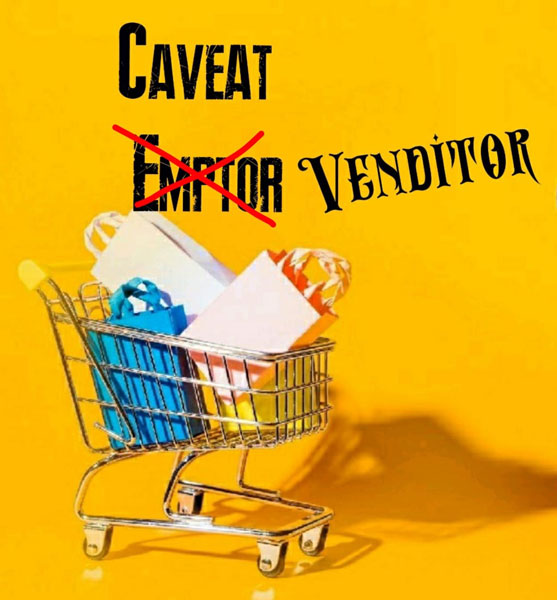What Is Caveat Emptor? A Complete Guide
Advertisement
Triston Martin
Oct 12, 2023
An Overview About Caveat Emptor
What is caveat emptor? Caveat Emptor is a Latin phrase that has been roughly translated into English in the form of "let purchasers beware." While the phrase is frequently employed as an expression of caution in English, it is frequently employed in legal commitment as a disclaimer. In many countries, the contract law puts the buyer's responsibility to do due diligence prior to making an acquisition. The term is often employed in real estate transactions of selling properties following the closing date. Still, it is also applicable to deals on other merchandise, such as automobiles.
The law of modern commercial transactions is aware of this and safeguards the buyer by stipulating diverse exceptions to the rule of caveat ex-post. In the event of a sample sale, it is a legal requirement to include an obligation in the contract that the majority of the product will be comparable to the sample's terms of quality. The purchaser has an opportunity to look at the entirety of the product. Also, suppose the purchaser knows the motive for which the products are needed. In that case, the law requires that the item is of a commercial (average) high-quality and appropriate for the purpose for which it is intended in the subsequent contract.
Caveat Emptor and Information Symmetry
The rule of caveat emptor stems mainly from the lack of information between buyers and sellers. The information is asymmetrical because the seller is likely to have more details about what they are selling than the purchaser. Thus, the buyer takes on the stake of damages in the product purchased.
If there is no specific guarantee regarding the quality of the product, the buyer must obtain all details about the product purchased. In the same way, the seller is not required to make false representations about the product or provide buyers with inaccurate information regarding the product.
Applications of Buyer Beware

The caveat emptor rule applies to purchasing any item or service. Today it is typically used in real property transactions. Specifically, laws control consumer goods transactions across different regions, and the caveat-emptor rule loses meaning. Additionally, the financial services sector is a significant exception to the principle of caveat emptor. The regulators require the sellers of financial goods to divulge as much data as possible to buyers. In general, any seller selling a financial product has to uniformly give relevant information regarding products. The caveat emptor rule should not apply if the seller is providing misleading information to the purchaser or if there is an error in the description regarding the products.
Caveat Emptor in Practice
According to the principle of caveat ex emptor, as an example, the consumer who buys an insulated coffee mug but then finds out that it is leaky will be stuck with the defective product. If they had checked out the mug before the sale, they could have altered their minds. An alternative is a used vehicle transaction with two individuals. The buyer should carefully research and examine the car, perhaps visiting mechanics for a closer review before closing the deal. If anything happens during the sale, such as a problem with the transmission being damaged, it's not the seller's responsibility. Garage sales illustrate caveat emptor where all sales are final, and nothing can be guaranteeable.
Caveat Venditor
Caveat Emptor used to be the standard for most land and property sales prior to the Industrial Revolution. But, sellers are held to higher responsibility regarding the quality of their products today. There was a lot less consumption of goods, mostly from local sources, before the 18th century, leading to a lack of lawful consumer protections (primarily focused on measurements and weights). The majority of sales across the USA are under the rule of caveat venditor, that is, "let sellers beware"; that is, an implied guarantee of merchantability protects the products. Except for the rare exception of advertising or agreed upon by the purchaser, almost all consumer goods are guaranteed to work when utilized for the intended purpose.

For example, a buyer purchasing a blender that isn't equipped for blending coffee beans could return the item for full reimbursement under an implied guarantee of merchantability. However, if the purchaser bought a used blender at a thrift shop marked "sold as-is," replacing the product afterward could prove challenging. Although caveat emptor isn't any longer the norm in consumer transactions, knowing when an exception applies is vital.
Conclusion
A caveat is a contract between seller and buyer that offers more protection after selling or trading your product. This contract has made both have the same rights and is enforceable and completely legal.







